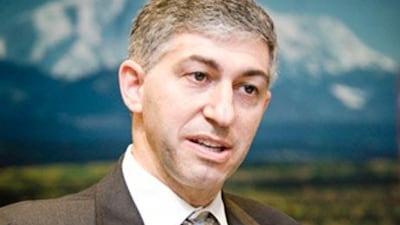Stuart Levey, the US Treasury under secretary for terrorism and financial intelligence, visited the region this week to reinforce his country's push for a new round of sanctions against Iran. The US is proposing additional UN sanctions as a response to the Iranian government's refusal to halt a nuclear programme it has pursued sporadically since the 1960s. Iran has repeatedly insisted its uranium enrichment activities are for peaceful power generation, assertions that have been met with scepticism by the US, Europe and the International Atomic Energy Agency.
"We believe it's very important to compare notes and to discuss this issue, and make sure that everyone is fully transparent about our strategy and to get advice from our friends," said Mr Levey, who started his trip this week in Switzerland before travelling to Saudi Arabia, the UAE and Oman. In meetings with government officials in the UAE, one of the US's closest allies in the Middle East, Mr Levey outlined new sanctions aimed squarely at the Iranian Revolutionary Guard Corps that attempt to spare the Iranian people and those Iranian businesses with no ties to the Revolutionary Guard. The UAE has long-standing trade and cultural ties to Iran; a majority of the goods that come into the UAE are re-exported, and a substantial portion of those go to the country's two main trading partners, India and Iran.
"One of the reasons I come here a lot is I want to get input on exactly how the things we're thinking about will affect [trade] relationships, because this is a place in which there is a long history of interaction," Mr Levey said. "There's shared culture and family ties, and a lot of travel between Iran and the UAE." "We are trying to affect the decision-making of the government in Iran," he said. "We have no desire to harm the Iranian people economically or otherwise, so part of the challenge for us is to get a lot of input so that we can try to understand how this all works so we can design measures that, to the maximum extent possible, meet that principle. This is not an area where you can always be 100 per cent surgically precise, but we try to do the best we can."
The US has had sanctions against Iran since 1987, when the former US president Ronald Reagan signed an executive order placing an import embargo on Iranian goods and services. Those restrictions were tightened under the former president Bill Clinton, who in 1995 ordered a halt to virtually all trade with Iran as a response to the country's alleged pursuit of nuclear weapons and its financing of organisations the US deemed to be involved in terrorism.
More restrictions have since been imposed on financial transactions involving Iran, and the US has increased pressure on allies in recent years to further restrict the flow of goods, services and money into the country. With the renewed push from the US for sanctions, many private companies have also voluntarily begun to cut ties with Iran. Siemens, the German conglomerate, early this year decided to stop doing business in Iran, as did several major oil services companies.
Many large insurers, including Swiss Re, Allianz and Hannover Re, have also pulled out. The insurers are crucial for Iran's large energy industry because shipping companies will not transport crude oil exports and refined petroleum imports without insurance. Iran is one of the world's largest oil exporters, but it still imports most of its petrol because of an ageing and underdeveloped refining infrastructure that has remained largely unchanged because of sanctions.
"Seeing major private sector players make this decision is interesting because I think it shows how they perceive the risk in Iran and how Iranian behaviour is becoming more and more self-isolating for Iran," Mr Levey said. "But also it gives us a little bit of optimism about the potential success of whatever strictures come along. To the extent the private sector is a willing participant, it makes sanctions measures more effective."
During the past few months, the US has focused diplomatic and sanctions enforcement efforts narrowly on the Revolutionary Guard and the sprawling empire of businesses it controls. According to the US Treasury department, the Revolutionary Guard holds sway over many of Iran's energy companies, as well as some of its largest construction and engineering firms. Yet the prospect of more sanctions, however precisely targeted, does not bode well for Iranian businesses in the UAE, according to Morteza Masoumzadeh, a director of the Iranian Business Council in Dubai and the owner of a shipping and trading business.
"No question it will have a very big negative impact on businesses in Dubai whether they are Iranian or whether they are other nationalities," he said. "Many businesses initially established in Dubai during the past 30 or 40 years were doing business with Iran, and therefore everybody will receive a negative impact on his business in Dubai, including Iranians. "Although there was no intention to affect individuals or businessmen in the UAE, [the previous sanctions] have affected us."
Whether new sanctions make it through the UN remains far from certain, however. China, a major importer of Iranian oil that wields veto power on the Security Council, has so far refused to support new sanctions. And Russia, another nation with veto power, has criticised the US proposals as overly harsh. Even if new UN sanctions are denied, however, other governmental and private-sector efforts could further isolate Iran on their own. The US Congress is considering legislation that would punish countries that supply refined petroleum to Iran, and EU leaders and diplomats have recently backed new trade restrictions.
@Email:afitch@thenational.ae

